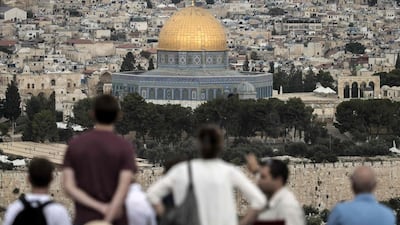Australia is facing a domestic and regional backlash after its Prime Minister suggested that Canberra is open to recognising Jerusalem as Israel’s capital and relocating its embassy to the contested city.
Scott Morrison, whose government is hoping to win a crucial by-election this week, called a press conference in which he said he was now “open-minded” to proposals that would move the Australian mission to the city. His new thinking represents a break of decades of Australian foreign policy.
"We're committed to a two-state solution, but frankly it hasn't been going that well, not a lot of progress has been made, and you don't keep doing the same thing and expect different results," Mr Morrison said. Australia’s mission remains in Tel Aviv.
The move would be highly controversial as the US remains the only world or regional power to have relocated its mission in the face of a wave of Arab opposition. The Palestinians seek East Jerusalem, the territory that Israel occupied in the 1967 Arab-Israeli War, as the capital of any future state. It has broad international support for its claim to the territory.
The announcement risks trade ties with Western allies and some of Australia’s key regional partners, such as Indonesia, which has expressed opposition to his comments, and Western allies.
Indonesian Foreign Minister Retno Marsudi, speaking at a joint news conference with Palestinian Foreign Minister Riyad Al Maliki in Jakarta, reaffirmed Indonesia's support for a two-state solution to the Middle East dispute and warned Australia against the risk of insecurity.
"Indonesia asks Australia and other countries to support peace talks...and not take steps that would threaten that peace process and stability of world security," Mr Marsudi said.
Thousands of Indonesians took to the country’s streets to protest the American embassy move in May.
Mr Maliki said he was saddened that Australia might violate international law and disrespect a UN Security Council resolution.
“They are risking Australia's trade and business relationship with the rest of the world, in particular (the) Arab and Muslim world,” he said.
______________
Read more
West Bank village braces for another two-state death blow
Hamas leader says won’t stop Gaza marches for ‘diesel fuel and dollars’
New Zealand activists raise funds for Palestine charity after fine by Israel
______________
The Palestinians have cut all ties with Washington over the embassy move and would likely take the same action with Canberra.
Ambassadors from 13 Arab countries met in Canberra on Tuesday and agreed to send a letter to Australia's foreign minister expressing their concern, Egyptian ambassador to Australia Mohamed Khairat said. Israel welcomed Mr Morrison’s apparent change in policy.
Mr Morrison has been accused by critics of a desperate grab for a domestic political victory ahead of the by-election that could see him lose his slim parliamentary majority. In a key Sydney district, voters will head to the polls on Saturday.
Mr Morrison's Liberal party candidate, a former ambassador to Israel, is trailing in the final stretch for control of the district with a sizeable Jewish population. Defeat would result in a period of instability for his government and would mean he will have to negotiate with independent lawmakers.
"Scott Morrison is now so desperate to hang on to his job, he is prepared to say anything if he thinks it will win him a few more votes – even at the cost of Australia's national interest," said opposition Labor party foreign policy spokeswoman Penny Wong.
The Australian leader’s predecessor Malcolm Turnbull had explicitly distanced itself from the decision by Trump to move the US embassy from Tel Aviv to Jerusalem, branding it “unhelpful” to the peace process.

